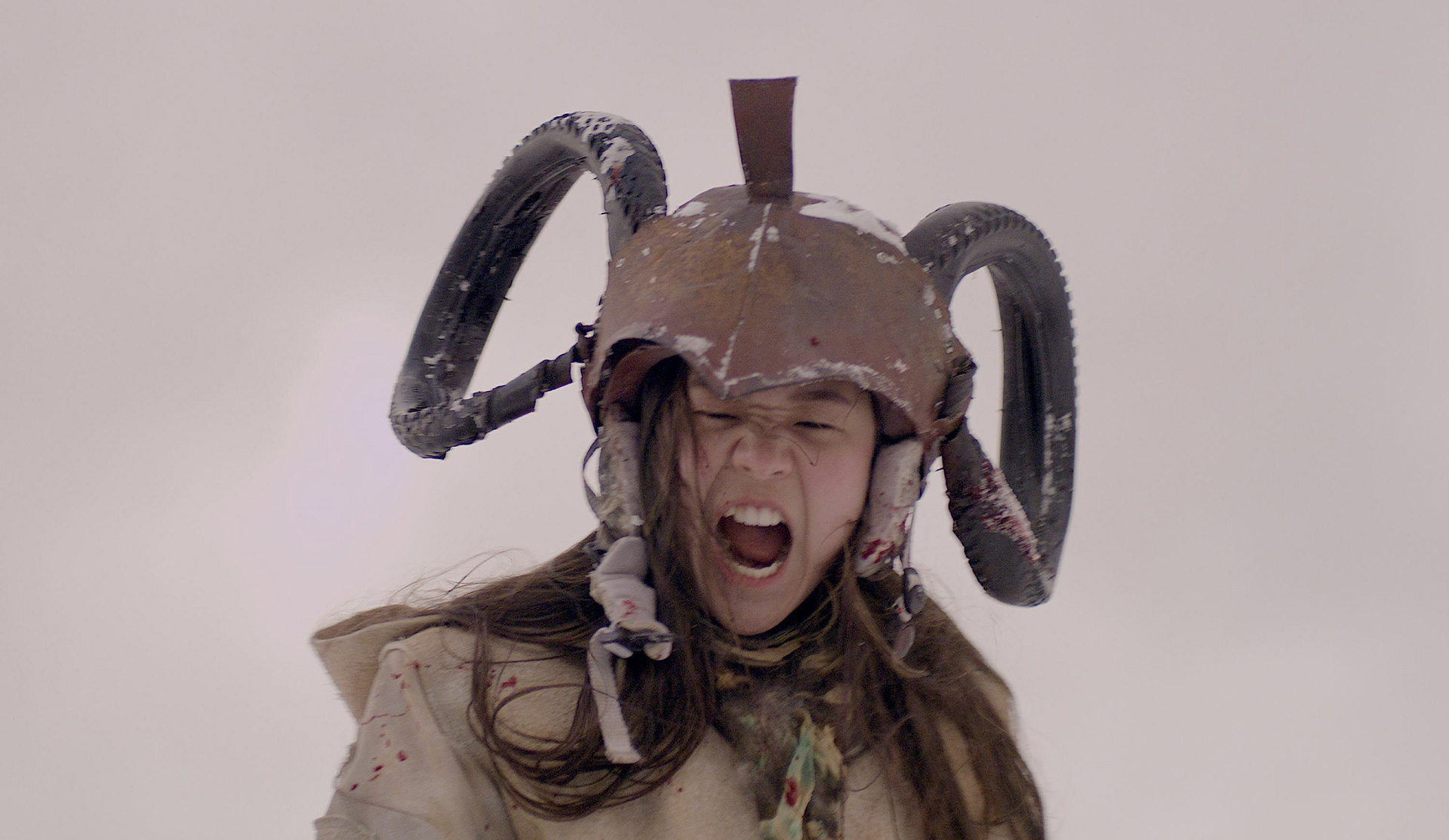In a post-eco-disaster 2144, a young girl (Viva Lee’s Sumi) lives as a polar bear cub in the snow. She crawls around with her “mother,” growling under the stars until a distant sound is heard, opening this world up wider. Sumi travels over the hill to discover a group of Morad hunters wielding machinery to cut down trees and brutalize whatever creatures might cross their path. When one inevitably sees Sumi in the distance, she screams to rally her ragtag clan and give chase. Most ferally run in pursuit. One (Kara Wooten) rises with patience and strength. Donning a metal stag helmet with horns, she clocks Sumi in the face to render her unconscious rather than dead. Locked in a cage, the girl’s adventure begins.
Writer-director Kirsten Carthew doesn’t shy from the fact her latest feature Polaris provides little in the way of concrete answers. The press notes describe it as an “origin story” for the setting—an entry point to what very well might be expanded upon in the future through different narratives residing under that same sky. Winter has consumed the Earth, so we can assume nothing as far as whether we’re in the frozen tundra of northern Canada or what once was a tropical paradise somewhere along the equator. None of the characters we meet can explain it either; Carthew ambitiously structures the entire film from Sumi’s perspective. And since this ten-year-old was raised by a bear, verbal language is little more than gibberish.
Without subtitles we’re as in the dark about dialogue as Sumi. Prepare to watch and listen in ways you’re perhaps not used to, tone and expression becoming our path towards understanding. While Sumi hisses and intimidates despite her small frame, those opposite her will either raise their weapons to fight or reveal their empty hands in a plea for peace. You can’t blame this girl for assuming the former whenever someone new arrives, though, especially when those strangers wear bear hides to keep warm. Sumi has already been taken from her home against her will; seeing those damning spoils of her captors’ war against nature does little to quell her desire for blood. Give her an inch and she’ll slit your throat.
This isn’t a kid’s film, regardless of its pre-teen protagonist trying to survive the elements of a land ravaged by apocalypse. Sumi not only has the upper portion of an animal mouth (with teeth bared) tied to the palms of each hand; she’s also bestowed with a supernatural force of magic. Those nature-made weapons become her hidden knives ready to take a chunk of flesh from whomever gets close. That unexplained power provides her a mystical healing presence—one no less grotesque when it allows her to remove the organs of victims and put them inside someone else missing the same. Add the surreal ability to talk with trees and Carthew does everything to let Sumi exist as both hero and metaphor.
This is crucial considering the lack of overall context. Our assumption then is that this is our future. This is what will happen as we continue to destroy the Earth’s climate and ecosystem. The Morad are thus the last remnants of us—vicious opportunists who’ve banded together to fulfill their unearned entitlement by preying upon the weak. They’ve neither learned anything from what happened nor care to imagine there could be any more consequences to their actions. Think Mad Max on ice. Half the world has returned to nature like Sumi; the other half has held tightly to machines for transportation, armor, and weaponry. Thus she’s Earth’s protector. Sumi is one with Mother Nature, willing to murder anybody who dares threaten Her.
She isn’t alone, though. Carthew not only introduces the potential for kindred spirits (Muriel Dutil’s Dee facilitates the Morad’s need for gasoline, only as a means to an end rather than as a card-carrying member), but also the prospect of a whole new species via the mysterious “Frozen Girl” (Khamisa Wilsher). Found in a cryo-capsule stolen from who-knows-where by another Morad, this inanimate figure is dressed in polished, pristine, ornate green armor. Has Carthew brought aliens into her sci-fi future? Is there an isolated kingdom with resources that somehow survived whatever cataclysmic event occurred in the past? I won’t lie: it’s frustrating to have to acknowledge we know nothing beyond the surface level, but that knowledge isn’t necessary to follow this specific journey.
Will not knowing still cause a large portion of the audience to reject Sumi’s eco-feminist parable? I’m certain of it. Polaris will prove a divisive work both because of its overt politics and bold desire to drop us in with as little comprehension of the bigger picture as its lead. Because you do have to remember that Sumi’s entire existence has been that of a bear cub. She doesn’t see humans as some holdover from a bygone era. They are as much predator or prey as other animals in the forest. Sumi has never seen blades like those used by the Morad. More than technological advancements, they are merely this new beast’s teeth and claws. It’s beauty that stops her in her tracks. Music. Stars. Love.
There’s a simplicity to that messaging that matches the simplicity of plot. In the end, Sumi just wants to find her “mother” again. It doesn’t matter how many enemies she must kill or how many friends she might save. All she knows is that following the North Star will reunite them—that’s what they’ve always done. Allusions to Ursa Minor and Major are eventually made literal in a way that forces us to question even more than we already have. Where does reality and fantasy divide when characters appear and disappear at will onto the earth and in the sky respectively? But even those higher-concept diversions reside within that same simplicity. We want Sumi to live. The rest is backdrop and atmosphere, for better or worse.
Polaris had its world premiere at the Fantasia International Film Festival.

